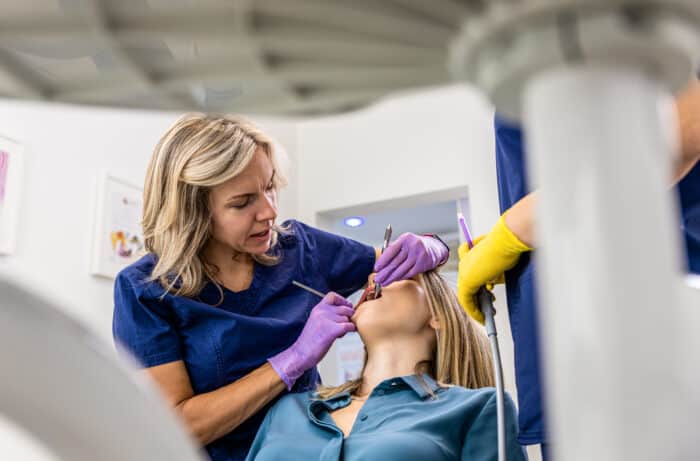If you’ve ever been curious about what it takes to become a dental assistant and what a dental assistant degree entails, you’ve come to the right place.
In this article, we will explore the ins and outs of the types of dental assistant degrees, the disadvantages of having one, and the recommended program for becoming a dental assistant.
So let’s take a closer look at the path to becoming a dental assistant.
Dental Assistant Associate Degree
One of the only ways to get a degree in dental assistance is to get an associate degree. A Dental Assistant Associate Degree can be your ticket to a rewarding career in the dental healthcare field.
This specialized program provides individuals with the knowledge and skills required to assist dentists in providing quality patient care.
Let’s delve into what a Dental Assistant Associate Degree is all about, including its cost, timeline, advantages, and potential disadvantages.
When considering a Dental Assistant Associate Degree, cost and duration are essential factors to keep in mind. On average, the cost of obtaining this degree can vary significantly depending on the institution, location, and financial aid options available. The tuition fees for the same might range from $10,000 to $30,000.
In terms of timeline, a Dental Assistant Associate Degree typically spans two years of full-time study. However, part-time and online programs may be available to accommodate individuals with other commitments, which can extend the duration of the degree.
Read: What is a Dental Assistant
Advantages of Dental Assistant Associate Degree:
1. Specialized Training: Dental Assistant Associate Degree programs are designed to provide focused education on dental procedures, patient care, and office management. This targeted approach ensures that graduates are well-prepared for the specific demands of the dental field.
2. Faster Entry into the Workforce: With a shorter timeline than traditional four-year degrees, you can enter the workforce more quickly and start gaining valuable experience.
3. University Certificate Alternative: An Associate Degree in Dental Assisting is often considered equivalent to or even more comprehensive than university certificate programs. It offers a broader range of coursework and a well-rounded education.
4. Through Education: These programs not only teach the technical aspects of dental assisting but also emphasize essential soft skills like communication and teamwork, making graduates more well-rounded professionals.
Disadvantages of Dental Assistant Associate Degree:
1. Time Commitment: Even though an Associate Degree is relatively shorter than a bachelor’s degree, it still requires a significant time commitment, and lasts a minimum of two years. This may be challenging for individuals with immediate financial or family needs.
2. Tuition Costs: While more affordable than traditional university degrees, tuition for Dental Assistant Associate Degree programs can still be a financial burden for some. Students might have to take the help of financial aid in the form of student debt at times.
3. Limited Career Advancement: A Dental Assistant Associate Degree is an excellent starting point for a career in dental assisting. However, if your long-term goals include more advanced positions, such as a dentist or dental hygienist, you may need to pursue further education.
4. Additional Costs: Pursuing an associate degree not only requires you to pay the required tuition fees, it also includes miscellaneous costs such as traveling to and from classes each day, accommodation, and more.
Read: Where can a Dental Assistant work
Do You Need a Degree to be a Dental Assistant?
In most cases, you don’t need a degree to work as a dental assistant. Dental assisting is one of those jobs where you have different ways to start your career.
You can learn on the job, attend a short vocational program, or get a certificate in dental assisting, which usually takes less than a year to complete. These options give you the basic skills you need for the job, like helping the dentist and keeping things clean.
However, if you decide to get a degree, like an Associate Degree, it can provide you with a more in-depth education. These degree programs cover a wider range of topics, such as taking X-rays, working with dental materials, and improving communication with patients.
Having a degree may make you more competitive when looking for jobs and might lead to better-paying positions. In some states, there are rules that say you need a degree or certification to do certain tasks, like taking X-rays.
Dental Assistant Degree vs. Certificate
When considering a career as a dental assistant, you can pursue either a dental assistant degree or a certificate in dental assisting.
Both paths have their advantages and considerations, so let’s compare them:
Dental Assistant Degree:
1. Comprehensive Education: A dental assistant degree, such as an Associate Degree, typically provides a more comprehensive education. It covers a broader range of topics, including dental materials, radiography, and patient interaction.
2. Longer Duration: Degree programs typically take two years to complete. This extended period allows for a deeper understanding of dental assisting and may include general education coursework.
3. Potential Advancement: Having a degree may open up more opportunities for advancement in the field or related healthcare roles. It can be a stepping stone for further education in dentistry or dental hygiene.
4. Competitive Edge: Graduates with a degree often have a competitive advantage in the job market. Some employers prefer candidates with more extensive education, especially in larger dental practices or clinics.
See Also: Dental Assistant Salary
Certificate in Dental Assisting:
1. Quick Entry: Certificate programs are shorter, usually taking less than a year to complete. This allows you to enter the workforce more rapidly.
2. Basic Skill Set: Certificate programs focus on providing you with the fundamental skills needed to work as a dental assistant. They cover essential tasks like chairside assistance, sterilization, and patient care.
3. Cost-Efficient: Certificate programs tend to be more affordable than degree programs, making them an attractive option for those on a budget.
4. State Requirements: In some states, a certificate or formal training is necessary to become a dental assistant. These programs often meet state licensing or registration requirements.
Can You Be a Dental Assistant Without a Degree?
Yes! You can work as a dental assistant without a degree. Many dental assistants start by learning on the job, getting hands-on experience as they go.
Alternatively, you can attend a shorter certificate program at a vocational school or via online programs, which provide focused training in dental assisting skills.
While formal degrees aren’t always required, some places may mandate certification or prefer candidates with formal education for certain tasks. Having a certificate or degree can enhance your job prospects in this field.
Now, you might be wondering if a program that allows you to learn how to become a dental assistant quickly and easily exists.
Well, it does.
Let us introduce you to:
Recommended Online Dental Assistant Program: PREPPY
Preppy’s program doesn’t just meet the criteria we discussed; it even surpasses them, in several ways, let’s see how.
Here’s what sets Preppy’s program apart:
1. University Certificate:
Upon completion of our program, you’ll receive a Certificate of Completion from the accredited university. This certificate enhances your resume and demonstrates your commitment to your career.
2. Accredited Education:
Preppy offers a Certified Dental Assistant Training Program in partnership with a respected accredited university. This accreditation ensures you’re receiving a top-tier education recognized by industry experts.
3. Budget-Friendly Tuition:
Worried about tuition costs? With Preppy, you can put those concerns to rest. Our dental assistant program is one of the most affordable options, preventing you from being buried under a mountain of student debt.
4. Flexible Online Learning:
Preppy’s program is incredibly convenient. You can study online at your own pace, tailoring your learning to fit your busy life.
5. Certification Exam Preparation:
Preppy doesn’t stop at basic training. Preppy goes the extra mile by preparing you for national certification exams offered by the Dental Assisting National Board (DANB) after program completion.
6. Quick Completion:
Looking to kickstart your career sooner? With Preppy, you can finish your training in as little as six months, enabling you to start earning sooner.
7. Hands-On Experience:
Real-world experience is invaluable. Preppy offers externship opportunities once you complete the course, allowing you to apply your knowledge in real healthcare settings before entering the workforce.
8. FREE Laptop:
Enroll in Preppy’s program, and you’ll receive a free laptop to keep, even after you’ve finished your studies. It’s a helpful bonus to support your learning.
9. Round-the-Clock Support:
No need to worry if you have questions or encounter issues. Preppy provides a dedicated Student Coordinator and 24/7 support, ensuring you can seek assistance whenever you need it.
Conclusion
In conclusion, pursuing a dental assistant degree is a rewarding path for those interested in the dental healthcare field. While it’s not the only route to becoming a dental assistant, it offers a more comprehensive education and can open doors to various job opportunities.
Whether you choose a degree, a certificate, or on-the-job training, the dental assisting profession continues to be a vital part of the healthcare industry, providing essential care and support to patients and dental practitioners.
Related Resources:
- Dental Assistant Job Description
- Pediatric Dental Assistant
- Travel Dental Assistant
- Is Dental Assistant a Good Career?
- What education is required to be a dental assistant?
- How much is dental assistant school
- Entry-Level Dental Assistant
- Dental Assistant Vs Medical Assistant
- Is Dental Assistant School Hard?
- Is Dental Assistant a Good Job?
- Dental Assistant Instrument Names
- Dental Assistant Internship & Externship
- Lead Dental Assistant
- Dental Assistant School
Related Articles
-
How to Be Successful in College in 2022 – 7 Simple Tips to Succeed
-
How Do Scholarships Work? Read This First…Truth is Shocking
-
7 Best College Majors 2024: What Should I Major In?
-
How to Choose a College – 10 Things You Must Consider in 2024
-
Why Go to College? Top 13 Benefits for Adult Students in 2022
-
Top 5 Best Alternatives to Community College for 2024








